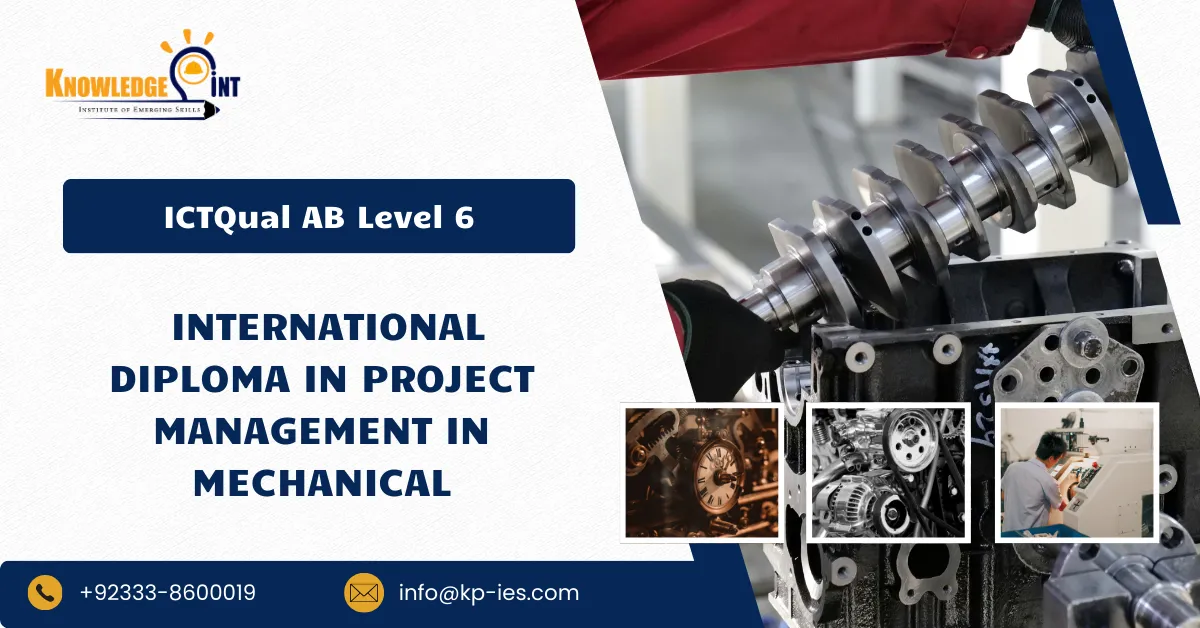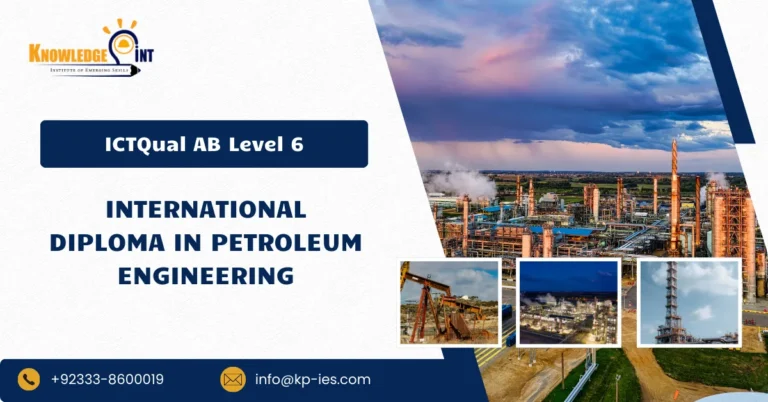In today’s rapidly advancing industrial and technological world, the demand for skilled professionals who can manage large-scale mechanical engineering projects is at an all-time high. From manufacturing plants and automation systems to energy infrastructure and robotics, every sector needs experts who can combine engineering expertise with strong project management skills. The ICTQual AB Level 6 International Diploma in Project Management in Mechanical is designed to meet this global demand by equipping learners with the technical knowledge, leadership skills, and strategic thinking required to excel in the field.
This prestigious diploma program integrates mechanical engineering fundamentals—such as design, thermodynamics, materials science, and advanced manufacturing—with project management disciplines including planning, budgeting, risk assessment, quality control, and leadership. Learners not only develop an in-depth understanding of mechanical systems but also gain the ability to plan, execute, and deliver complex projects that meet international standards and sustainability goals.
The course spans 36 mandatory units over three years, carefully structured to cover foundations, applied practices, and advanced strategy. By the end of the program, graduates will be well-prepared for leadership roles in mechanical industries worldwide, with skills applicable across manufacturing, energy, automotive, robotics, aerospace, and industrial engineering sectors.
Course Overview
Year 1 – Foundations in Mechanical Project Management
Students build a strong base in mechanical engineering principles while being introduced to essential project management skills. Topics include:
- Principles of Mechanical Project Management
- Engineering Mathematics & Applied Statistics
- Thermodynamics and Heat Transfer Basics
- Materials Science & Mechanical Properties
- Engineering Drawing & CAD Fundamentals
- Statics, Dynamics & Kinematics
- Fluid Mechanics for Engineers
- Manufacturing Processes & Workshop Practice
- Electrical & Electronic Systems in Mechanical Engineering
- Mechanical Design Fundamentals
- Business Communication & Team Work in Engineering
- Health, Safety & Environmental Practices in Mechanical Projects
Year 2 – Applied Mechanical Project Practices
Learners apply engineering theory to practical project environments, focusing on system design, quality, planning, and technology integration:
13. Advanced Mechanical System Design
14. Control Systems & Instrumentation
15. Mechanical Vibrations & Dynamics
16. Project Planning & Scheduling for Mechanical Projects
17. Cost Estimation & Financial Control in Mechanical Projects
18. Quality Management & Assurance in Mechanical Production
19. Procurement, Supply Chain & Vendor Management for Mechanical Projects
20. Risk Assessment, Compliance & Safety in Mechanical Systems
21. Lean Manufacturing & Process Optimization
22. Automation and Mechatronics in Mechanical Engineering
23. Data Analytics for Mechanical Project Decision Making
24. Ethics, Governance & Sustainability in Mechanical Engineering
Year 3 – Advanced Strategy, Innovation & Leadership
In the final year, students move towards advanced project strategy, leadership, and future technologies:
25. Strategic Planning for Mechanical Project Portfolios
26. Leadership, Change Management & Organizational Behavior in Engineering Firms
27. Global Standards & Certification (ISO, ASME etc.)
28. Innovation, Emerging Technology & Industry 4.0 in Mechanical Projects
29. Crisis, Conflict & Risk Management in Mechanical Projects
30. Negotiation & Stakeholder Management in Mechanical & Industrial Contexts
31. Energy Systems & Sustainable Mechanical Design
32. Finite Element Analysis (FEA) & Simulation Tools
33. Advanced Manufacturing Technologies (CNC, Additive Manufacturing, Robotics)
34. Research Methods for Mechanical Project Environments
35. Capstone / Final Mechanical Project (Dissertation / Industrial Project)
36. Future Trends: Smart Manufacturing, IoT, and Sustainable Mechanical Systems
Learning Outcomes for ICTQual AB Level 6 International Diploma in Project Management in Mechanical
Year 1 – Foundations in Mechanical Project Management
- Principles of Mechanical Project Management
- Explain the fundamentals of project management within mechanical engineering contexts.
- Identify project lifecycle phases and apply suitable methodologies.
- Demonstrate awareness of roles, responsibilities, and teamwork in projects.
- Engineering Mathematics & Applied Statistics
- Apply mathematical principles to solve mechanical engineering problems.
- Use statistical tools for data interpretation in engineering projects.
- Model and analyze engineering systems using applied mathematics.
- Thermodynamics and Heat Transfer Basics
- Explain the laws of thermodynamics and their engineering applications.
- Analyze heat transfer processes such as conduction, convection, and radiation.
- Apply thermodynamics to mechanical systems design.
- Materials Science & Mechanical Properties
- Identify different engineering materials and their properties.
- Evaluate material performance under stress, fatigue, and load conditions.
- Select appropriate materials for mechanical applications.
- Engineering Drawing & CAD Fundamentals
- Interpret and create engineering drawings using industry standards.
- Apply CAD tools for 2D and 3D mechanical design.
- Communicate design ideas effectively through technical drawings.
- Statics, Dynamics & Kinematics
- Apply the principles of forces, equilibrium, and motion.
- Analyze velocity, acceleration, and kinematic behavior of mechanical systems.
- Solve static and dynamic engineering problems.
- Fluid Mechanics for Engineers
- Explain fundamental fluid properties and behaviors.
- Analyze fluid flow, pressure, and mechanical system performance.
- Apply fluid mechanics in design and system analysis.
- Manufacturing Processes & Workshop Practice
- Demonstrate knowledge of manufacturing processes (casting, machining, welding, etc.).
- Apply safe workshop practices and standards.
- Select suitable processes for specific mechanical components.
- Electrical & Electronic Systems in Mechanical Engineering
- Describe the integration of electrical/electronic systems in mechanical engineering.
- Apply basic circuit and control principles to mechanical systems.
- Evaluate the role of sensors, actuators, and electronic components in machines.
- Mechanical Design Fundamentals
- Apply design principles to create functional mechanical components.
- Evaluate performance, safety, and cost considerations in design.
- Use design methods to optimize mechanical products.
- Business Communication & Team Work in Engineering
- Develop effective communication for technical and business purposes.
- Apply teamwork principles in engineering project environments.
- Demonstrate negotiation and conflict resolution skills.
- Health, Safety & Environmental Practices in Mechanical Projects
- Apply workplace health and safety regulations in engineering contexts.
- Evaluate environmental considerations in mechanical projects.
- Demonstrate hazard assessment and risk mitigation strategies.
Year 2 – Applied Mechanical Project Practices
- Advanced Mechanical System Design
- Design advanced systems integrating mechanical, thermal, and structural principles.
- Apply simulation and testing to validate designs.
- Optimize designs for performance, cost, and safety.
- Control Systems & Instrumentation
- Explain principles of control systems in mechanical engineering.
- Apply instrumentation to monitor and control system performance.
- Integrate feedback systems into mechanical designs.
- Mechanical Vibrations & Dynamics
- Analyze vibration modes in mechanical structures.
- Apply methods to reduce harmful vibrations in design.
- Evaluate dynamic responses in complex mechanical systems.
- Project Planning & Scheduling for Mechanical Projects
- Develop project schedules using tools such as Gantt charts and CPM.
- Allocate resources and manage dependencies effectively.
- Apply project management software for planning and tracking.
- Cost Estimation & Financial Control in Mechanical Projects
- Prepare accurate cost estimates for mechanical projects.
- Monitor and control project budgets.
- Evaluate financial risks and implement cost-saving strategies.
- Quality Management & Assurance in Mechanical Production
- Apply principles of quality management systems (e.g., ISO 9001).
- Use tools for quality assurance and control in production.
- Monitor and evaluate product compliance with quality standards.
- Procurement, Supply Chain & Vendor Management for Mechanical Projects
- Evaluate supplier capabilities and negotiate contracts.
- Manage procurement processes in mechanical projects.
- Optimize supply chain efficiency and vendor performance.
- Risk Assessment, Compliance & Safety in Mechanical Systems
- Identify risks in mechanical systems and projects.
- Conduct compliance checks with industry regulations.
- Develop safety protocols and emergency response strategies.
- Lean Manufacturing & Process Optimization
- Apply lean principles to minimize waste in production.
- Use process optimization tools to increase efficiency.
- Monitor continuous improvement initiatives in mechanical systems.
- Automation and Mechatronics in Mechanical Engineering
- Integrate mechanical, electrical, and control systems into mechatronic solutions.
- Evaluate automation systems in mechanical design.
- Apply robotics and PLCs in project environments.
- Data Analytics for Mechanical Project Decision Making
- Use data analysis tools to improve project outcomes.
- Interpret engineering data for decision-making.
- Apply predictive analytics in mechanical system performance.
- Ethics, Governance & Sustainability in Mechanical Engineering
- Apply ethical frameworks in engineering decision-making.
- Demonstrate knowledge of governance practices in mechanical projects.
- Evaluate sustainable approaches in design and manufacturing.
Year 3 – Advanced Strategy, Innovation & Leadership
- Strategic Planning for Mechanical Project Portfolios
- Align mechanical projects with organizational strategies.
- Evaluate portfolio risks and returns.
- Develop strategic plans for multiple projects.
- Leadership, Change Management & Organizational Behavior in Engineering Firms
- Apply leadership theories in engineering contexts.
- Manage organizational change effectively.
- Demonstrate skills in motivating and managing diverse teams.
- Global Standards & Certification (ISO, ASME etc.)
- Explain international mechanical engineering standards.
- Apply certification processes (ISO, ASME, etc.) in projects.
- Ensure compliance in global project delivery.
- Innovation, Emerging Technology & Industry 4.0 in Mechanical Projects
- Evaluate the impact of Industry 4.0 on mechanical projects.
- Integrate emerging technologies such as IoT, robotics, and digital twins.
- Apply innovation strategies to engineering project development.
- Crisis, Conflict & Risk Management in Mechanical Projects
- Identify potential crisis scenarios in mechanical projects.
- Apply conflict resolution and mediation strategies.
- Implement contingency plans for risk management.
- Negotiation & Stakeholder Management in Mechanical & Industrial Contexts
- Apply negotiation techniques in project environments.
- Manage stakeholder expectations and engagement.
- Build collaborative partnerships in industrial projects.
- Energy Systems & Sustainable Mechanical Design
- Analyze energy systems for efficiency and sustainability.
- Apply renewable energy solutions to mechanical projects.
- Design systems that minimize environmental impact.
- Finite Element Analysis (FEA) & Simulation Tools
- Apply FEA methods to evaluate mechanical components.
- Use simulation software for stress, strain, and thermal analysis.
- Validate design performance using computational tools.
- Advanced Manufacturing Technologies (CNC, Additive Manufacturing, Robotics)
- Apply CNC machining, robotics, and 3D printing in manufacturing.
- Evaluate the benefits of advanced technologies in production.
- Integrate automation into modern mechanical manufacturing.
- Research Methods for Mechanical Project Environments
- Apply qualitative and quantitative research methods.
- Analyze project-related engineering data.
- Prepare professional research reports and presentations.
- Capstone / Final Mechanical Project (Dissertation / Industrial Project)
- Plan and execute a significant mechanical project.
- Integrate technical and managerial knowledge to deliver outcomes.
- Present findings professionally to industry standards.
- Future Trends: Smart Manufacturing, IoT, and Sustainable Mechanical Systems
- Evaluate smart manufacturing trends and digitalization.
- Apply IoT concepts to mechanical project management.
- Assess sustainable mechanical practices for the future.
Course Benefits of ICTQual AB Level 6 International Diploma in Project Management in Mechanical
- Strong foundation in mechanical systems and project management.
- Exposure to cutting-edge technologies like Industry 4.0, IoT, and robotics.
- Development of leadership, negotiation, and stakeholder management skills.
- Hands-on expertise in CAD, FEA, CNC, automation, and lean methods.
- Industry-focused capstone project to demonstrate professional readiness.
- Globally recognized diploma with career flexibility across industries.
After completing this course, learners can progress in the following ways:
- Strong foundation in mechanical systems and project management.
- Exposure to cutting-edge technologies like Industry 4.0, IoT, and robotics.
- Development of leadership, negotiation, and stakeholder management skills.
- Hands-on expertise in CAD, FEA, CNC, automation, and lean methods.
- Industry-focused capstone project to demonstrate professional readiness.
- Globally recognized diploma with career flexibility across industries.







